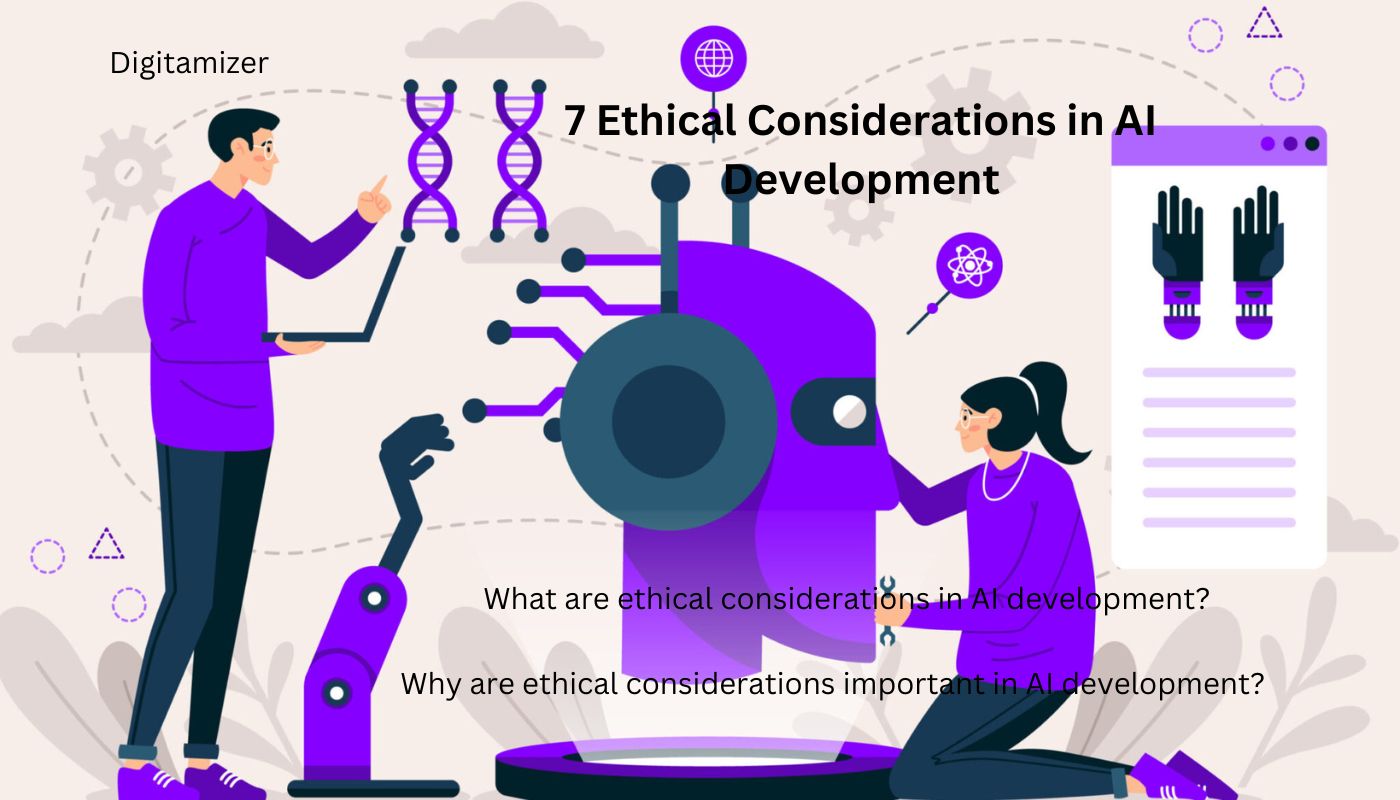Introduction – Ethical Considerations in AI Development
In the short-paced realm of artificial intelligence (AI) improvement, navigating the moral panorama is paramount to make sure that technological advancements align with societal values and principles. As AI continues to permeate various facets of our lives, from healthcare and finance to transportation and entertainment, the ethical issues surrounding its development and deployment have become increasingly more complicated and urgent.
This article embarks on an adventure to explore seven essential ethical considerations in AI development These considerations function as guiding principles to cope with the multifaceted challenges and dilemmas inherent in developing AI structures that are not only technically advanced but also ethically sound. From transparency and fairness to accountability, privateness, bias mitigation, safety, and societal effect, every measurement plays a pivotal role in shaping the ethical framework of AI and ethical considerations in AI development.
By delving into those ethical dimensions, we goal to illuminate the complexities of AI improvement and provide insights into how stakeholders can navigate the moral panorama to make certain that AI technologies serve the not unusual accurately while upholding fundamental principles of equity, justice, and respect for human dignity. Through this exploration, we are searching to foster a deeper know-how of the moral imperatives that underpin AI innovation in the pursuit of a more ethical and equitable destiny and ethical considerations in AI development.
Transparency – Ethical Considerations in AI Development

Transparency is a cornerstone of moral AI development, ensuring that AI systems are comprehensible, interpretable, and responsible to both builders and stop-customers. In the context of AI, transparency refers to the clarity and openness of AI systems, consisting of their underlying algorithms, selection-making strategies, and information resources. Transparent AI systems inspire acceptance as true and self-belief amongst customers using presenting visibility into how selections are made and why sure outcomes are reached.
One of the primary demanding situations in achieving transparency in AI is the inherent complexity of gadget-mastering algorithms and deep neural networks. These algorithms perform as black boxes, making it hard for users to discern the rationale at the back of their decisions. However, various techniques and strategies can be employed to sell transparency in AI improvement.
Firstly, builders can prioritize the use of interpretable machines getting to know models that can be extra obvious and explainable. Techniques inclusive of selection bushes, linear regression, and rule-based total structures provide greater transparency as compared to greater complicated models like deep mastering neural networks.
Secondly, developers must document and disclose the records resources used to teach AI models, in addition to any preprocessing steps or characteristic engineering techniques hired. Providing transparency approximately the data used to teach AI fashions helps customers apprehend the ability biases and obstacles of the machine.
Additionally, builders can put into effect version explainability techniques to clarify how AI systems arrive at their choices. Techniques such as function importance analysis, SHAP (SHapley Additive exPlanations) values, and local interpretable model-agnostic explanations (LIME) provide insights into the elements influencing AI predictions.
Furthermore, adopting open-supply development practices can enhance transparency by allowing outside researchers and auditors to scrutinize AI systems and pick out potential biases or vulnerabilities and ethical considerations in AI development.
In summary, transparency in AI improvement is vital for building acceptance as true with, responsibility, and expertise amongst users. By prioritizing transparency and adopting transparent AI design concepts and practices, developers can create AI structures that might be extra responsible, interpretable, and ethically sound.
Fairness – Ethical Considerations in AI Development

Fairness in AI improvement is a crucial consideration to ensure that AI systems deal with people and companies equitably and ethical considerations in AI development, irrespective of their demographic traits or other attributes. Fairness encompasses various dimensions, inclusive of algorithmic bias, discrimination, and equitable effects. Addressing fairness in AI is critical to prevent the perpetuation or exacerbation of present inequalities and to uphold principles of justice and equality.
One of the primary challenges in accomplishing equity in AI is the presence of biases in training facts or algorithmic selection-making approaches. Biases can get up because of historical inequalities, societal prejudices, or skewed statistical representations. These biases can lead to discriminatory results, disadvantaging positive corporations and perpetuating systemic injustices.
To mitigate bias and promote equity in AI, developers need to cautiously evaluate training records for biases and take proactive measures to cope with them. Techniques that include bias detection algorithms, fairness-aware system learning, and opposed education can help identify and mitigate biases in AI systems.
Moreover, developers need to recall the impact of AI structures on different demographic companies and make sure that their design and deployment do now not disproportionately damage marginalized or inclined groups. This requires diverse representation in dataset series, in addition to the incorporation of equity constraints and evaluation metrics at some point of algorithm improvement.
Additionally, transparency and responsibility are important for selling equity in AI. Providing factors for AI selections and permitting users to recognize and undertake algorithmic effects can assist mitigate concerns about equity. Furthermore, organizing mechanisms for recourse and redress in instances of unfair remedy can beautify responsibility and belief in AI systems.
In summary, fairness is a fundamental moral attention in AI improvement that calls for proactive efforts to mitigate biases, sell equitable effects, and uphold standards of justice equality, and ethical considerations in AI development. By prioritizing fairness and adopting equity-aware design practices, builders can create AI systems that deal with all individuals and businesses fairly and make contributions to a greater just and equitable society and ethical considerations in AI development.
Accountability – Ethical Considerations in AI Development

Accountability in AI improvement is paramount to ensure that builders, designers, and users are held liable for the movements and choices of AI systems. Accountability encompasses various dimensions, inclusive of transparency, oversight, and recourse mechanisms. Establishing clean traces of accountability is vital to mitigating risks, dealing with harm, and fostering agreement with AI technology.
One of the primary demanding situations in achieving accountability in AI is the complexity and opacity of AI systems. Unlike conventional software programs, AI algorithms regularly operate as black bins, making it difficult to hint at the decision-making process or pick out accountable parties. Moreover, the involvement of a couple of stakeholders, along with builders, data scientists, policymakers, and stop-customers, similarly complicates duty systems.
To deal with those challenges, developers ought to prioritize transparency and documentation during the AI improvement lifecycle. Providing factors for AI choices, documenting information assets and preprocessing steps, and disclosing capacity limitations and biases are vital transparency measures that allow customers to apprehend and scrutinize AI structures.
Moreover, setting up oversight mechanisms and regulatory frameworks can decorate responsibility by way of keeping developers and agencies accountable for the ethical and felony implications of their AI systems and ethical considerations in AI development. This might also include creating independent evaluation boards, implementing certification programs, or updating existing legal guidelines and rules to cope with the particular challenges posed using AI technologies.
Additionally, builders must design AI structures with integrated mechanisms for recourse and redress in instances of errors, biases, or harm. This can also encompass providing channels for remarks and grievance resolution, in addition to implementing safeguards to save you from misuse or abuse of AI technology and ethical considerations in AI development.
In precis, responsibility is essential ethical attention in AI improvement that calls for proactive efforts to sell transparency, set up oversight mechanisms, and offer recourse mechanisms for customers and ethical considerations in AI development. By prioritizing duty and adopting responsible AI design practices, builders can build consideration and self-assurance in AI technologies and mitigate risks of misuse or damage.
Privacy – Ethical Considerations in AI Development

Privacy in AI development is an important attention in guarding a person’s facts and shielding a person’s rights and freedoms. With the proliferation of AI technology that relies on vast quantities of private records, ensuring privacy is vital to preserving consideration and self-belief among customers.
One of the primary challenges in reaching privateness in AI is the potential for information misuse and breaches. AI structures frequently depend on massive datasets to train algorithms and make predictions, raising worries approximately the gathering, storage, and use of sensitive personal information. To address these concerns, developers ought to implement strong data safety measures, such as record anonymization, encryption, and access controls. Moreover, compliance with privacy regulations together with the General Data Protection Regulation (GDPR) and the California Consumer Privacy Act (CCPA) is important to make certain that AI structures recognize user privacy rights.
Furthermore, developers have to prioritize privacy with the aid of layout principles, integrating privacy concerns into the design and development of AI structures from the outset. This includes carrying out privacy impact tests, minimizing information collection and retention, and presenting customers with transparency and control over their records.
Additionally, builders have to cope with the precise privacy challenges posed by using AI technologies, such as the hazard of re-identification in anonymized datasets or the capacity for unintentional statistics disclosures through algorithmic decision-making strategies. Techniques along with differential privacy federated getting-to-know, and information minimization can assist mitigate these dangers and beautify privacy protections in AI structures and ethical considerations in AI development.
In summary, privacy is an essential ethical consideration in AI development that requires proactive efforts to protect consumer information and uphold privacy rights. By imposing strong records safety measures, complying with privacy regulations, and integrating privacy considerations into the layout and improvement of AI systems, developers can construct agreement with and confidence amongst users and mitigate risks of information misuse or privacy breaches.
Bias Mitigation – Ethical Considerations in AI Development

Bias mitigation in AI development is critical to make certain that AI structures deal with individuals and companies pretty and equitably, regardless of their demographic characteristics or different attributes and ethical considerations in AI development. Bias in AI can stand up from diverse assets, including biased education records, algorithmic decision-making methods, and human biases encoded into AI structures. Addressing bias in AI requires proactive efforts to pick out, mitigate, and save your biases from influencing algorithmic outcomes.
One of the number one demanding situations in bias mitigation is the presence of biases in training data, that could replicate or perpetuate existing societal biases and stereotypes. To mitigate bias in education records, builders have to cautiously examine datasets for biases and take steps to take away or mitigate them. Techniques including fact preprocessing, bias detection algorithms, and records augmentation can help pick out and mitigate biases in training data.
Moreover, builders have to take into account the ability for bias in algorithmic choice-making tactics and take steps to ensure fairness and equity. This might also involve enforcing equity-conscious machine mastering techniques, together with fairness constraints or bias mitigation algorithms, to mitigate biases in algorithmic predictions.
Additionally, developers need to address human biases that can be encoded into AI structures via the layout and improvement system. This requires fostering variety and inclusion in AI development teams, as well as incorporating diverse views and feedback into the design and assessment of AI systems and ethical considerations in AI development.
Furthermore, transparency and accountability are vital for bias mitigation in AI development and ethical considerations in AI development. Providing factors for AI choices, allowing customers to understand and venture algorithmic outcomes, and organizing mechanisms for recourse and redress in cases of biased treatment can help mitigate issues about bias and sell equity in AI systems.
In precis, bias mitigation is a fundamental moral attention in AI development that calls for proactive efforts to become aware of, mitigate, and save your biases from influencing algorithmic consequences. By implementing strong bias mitigation strategies, fostering range and inclusion, and selling transparency and duty, developers can build trust and self-assurance amongst users and make sure that AI structures treat people and corporations fairly and equitably.
Safety – Ethical Considerations in AI Development

Safety in AI development is a paramount ethical consideration to make certain that AI structures perform reliably and responsibly, minimizing the dangers of unintentional outcomes or damage. As AI packages permeate important domain names inclusive of healthcare, transportation, and public protection, addressing safety concerns turns into important to uphold the well-being of individuals and society at big.
One of the number one challenges in ensuring safety in AI is the potential for accidental results and device screw-ups. AI systems, especially the ones that use of advanced device mastering models, can show off unpredictable behaviors or make errors in positive scenarios. To address this, developers need to behavior rigorous checking out and validation tactics to become aware of and rectify capability troubles. Implementing fail-secure mechanisms and adhering to enterprise protection standards are also essential steps in enhancing the safety of AI structures and ethical considerations in AI development.
Furthermore, builders ought to bear in mind the wider societal impact of AI programs to make certain that protection issues are very well evaluated. This requires ethical issues all through the design and deployment levels, considering the ability to affect human lives, well-being, and the environment, and ethical considerations in AI development.
In protection-crucial packages inclusive of self-reliant motors or scientific diagnosis, organizing industry-wide safety requirements and policies becomes vital. Collaboration among enterprise stakeholders, policymakers, and specialists is important to broaden tips that prioritize safety without stifling innovation.
Additionally, ongoing tracking and editions are essential for ensuring the continued protection of AI structures. As the generation evolves and new dangers emerge, builders need to remain vigilant and proactive in addressing potential protection concerns and ethical considerations in AI development. Continuous getting to know from actual-world deployments and incorporating comment loops into AI systems contribute to their adaptive protection.
In the end, protection in AI improvement is a multifaceted undertaking that needs proactive efforts to pick out, save you, and mitigate potential risks. By undertaking thorough trying out, adhering to safety requirements, thinking about societal influences, and fostering ongoing monitoring and adaptation, builders can contribute to constructing AI structures that prioritize protection and function responsibly in various domain names and ethical considerations in AI development.
Societal Impact – Ethical Considerations in AI Development

The social effect of AI development encompasses a wide range of ethical considerations that increase beyond technical components to encompass broader societal implications and ethical considerations in AI development. As AI technology preserves to adapt and permeate diverse components of our lives, it’s miles critical to study their capacity effects on people, groups, and society as an entire.
One of the primary demanding situations in assessing the social impact of AI is the potential for exacerbating current inequalities and disparities. AI systems may additionally inadvertently perpetuate biases or discrimination, mainly due to unequal admission to possibilities or assets. Additionally, AI-driven automation can disrupt exertions markets, leading to process displacement or financial insecurity for certain business of employees.
To address those demanding situations, builders and policymakers should bear in mind the social implications of AI technologies and take proactive measures to mitigate ability harms. This may also involve incorporating moral issues into the design and deployment of AI structures, which include promoting fairness, transparency, and accountability. Moreover, fostering diversity and inclusion in AI development groups can assist make certain that numerous views are taken into consideration and that AI structures are designed with the wishes and values of all stakeholders in mind.
Furthermore, AI technology can cope with socially demanding situations and enhance first-rate lifestyles for individuals and communities. For example, AI-driven healthcare innovations can beautify diagnosis and remedy results, whilst AI-powered schooling structures can boom get admission to first-class schooling sources. By leveraging AI technology for social accuracy, developers can make contributions to superb social influences and promote equitable admission to advantages throughout numerous populations.
In summary, the social effect of ethical considerations in AI development is a multifaceted issue that requires careful consideration of moral, cultural, and societal elements. By prioritizing moral ideas, selling variety and inclusion, and leveraging AI for social excellence, developers can ensure that AI technology contributes to a more equitable and inclusive society.
Conclusion – Ethical Considerations in AI Development
In conclusion, navigating the ethical landscape of AI improvement requires careful consideration of 7 important considerations: transparency, fairness, duty, privacy, bias mitigation, protection, and social impact. These considerations function as guiding standards to make certain that AI technology is advanced and deployed responsibly, ethically, and in alignment with societal values and norms.
Transparency is important to foster consideration and responsibility, permitting users to recognize how AI structures make decisions and why certain effects are reached. Fairness ensures equitable remedies for individuals and companies, mitigating biases and discrimination in AI systems. Accountability holds developers and stakeholders responsible for the actions and selections of AI technologies, selling ethical behavior and oversight.
Privacy safeguards consumer facts and protects man or woman rights, making sure that AI systems recognize consumer privacy rights and observe relevant policies. Bias mitigation addresses biases in education data and algorithmic decision-making methods, promoting equity and equity in AI results. Safety prioritizes the reliability and accountable operation of AI structures, minimizing the dangers of unintended effects or harm.
Social impact examines the wider implications of AI technology on people, groups, and society, striving to maximize advantages whilst mitigating ability risks and disparities. By addressing these considerations, builders, policymakers, and stakeholders can navigate the ethical panorama of AI improvement and promote accountable innovation that serves the common good.
Moving ahead, it’s miles imperative to integrate moral standards into all ranges of the AI improvement lifecycle, from design and implementation to deployment and evaluation. Collaboration among industry stakeholders, policymakers, ethicists, and researchers is essential to develop suggestions, standards, and first-rate practices that prioritize ethical considerations in AI development.
Ultimately, with the aid of prioritizing ethical concerns and upholding ideas of transparency, equity, responsibility, privateness, bias mitigation, safety, and social impact, we can harness the transformative ability of AI technologies to create a greater equitable, inclusive, and ethical future for all.
What are ethical considerations in AI development?
Ethical considerations in AI development refer to the moral and societal implications of creating and deploying AI technologies. These considerations include fairness, accountability, transparency, privacy, bias, safety, and societal impact.
Why are ethical considerations important in AI development?
Ethical considerations are important in AI development because AI technologies have the potential to impact individuals, communities, and society as a whole. Addressing ethical concerns ensures that AI systems are developed and deployed in a way that respects human rights, promotes fairness and equity, and minimizes harm.
What is fairness in AI, and why is it important?
Fairness in AI refers to ensuring that AI systems treat all individuals and groups fairly and without bias or discrimination. It is important to prevent AI systems from perpetuating or amplifying existing societal biases and inequalities.
How can AI developers ensure accountability and transparency in AI systems?
AI developers can ensure accountability and transparency by documenting and disclosing how AI systems are designed, trained, and evaluated. They should also establish mechanisms for monitoring and auditing AI systems to detect and address issues of bias, error, or misuse.
What measures can be taken to mitigate bias in AI systems?
Measures to mitigate bias in AI systems include diverse and representative training data, careful feature selection, bias detection and correction algorithms, and ongoing monitoring and evaluation of AI system performance across different demographic groups.
How can privacy be protected in the development and deployment of AI technologies?
Privacy can be protected in the development and deployment of AI technologies by implementing privacy-preserving techniques such as data anonymization, encryption, and differential privacy. Additionally, clear and transparent data usage policies and consent mechanisms should be established to ensure that individuals have control over their personal data.
What are the safety considerations associated with AI development?
Safety considerations in AI development involve ensuring that AI systems are designed and deployed in a way that minimizes the risk of harm to individuals and society. This includes robust testing, validation, and risk assessment procedures to identify and mitigate potential safety hazards.
How can AI developers address the societal impact of AI technologies?
AI developers can address the societal impact of AI technologies by engaging with diverse stakeholders, including communities, policymakers, and civil society organizations, to understand their concerns and priorities. They should also consider the broader societal implications of AI deployment and work collaboratively to maximize the benefits and minimize the risks.
What regulatory frameworks and guidelines exist for addressing ethical considerations in AI development?
Several regulatory frameworks and guidelines exist for addressing ethical considerations in AI development, including industry standards, government regulations, and international initiatives such as the OECD Principles on AI and the European Commission's Ethics Guidelines for Trustworthy AI.
How can stakeholders ensure that AI technologies are developed and deployed ethically?
Stakeholders can ensure that AI technologies are developed and deployed ethically by promoting transparency, accountability, and inclusivity in AI development processes. This involves ongoing dialogue, collaboration, and engagement among developers, policymakers, civil society, and affected communities to address ethical concerns and uphold shared values and principles.
Digital Marketing Services, SEO and E-Commerce Solutions in Delhi, India
Author – Farhanul Haque
The article “7 Ethical Considerations in AI Development” is written by the Founder of Digitamizer who has been working in the e-Commerce Sector Since 2006 and is also a certified Digital Marketing Professional from IIT, Delhi, India.


You are truly an accomplished webmaster. The site loads in an astounding amount of time. It appears that you are employing some sort of unique technique. Furthermore, the contents are flawless; you have accomplished an outstanding job on this subject.